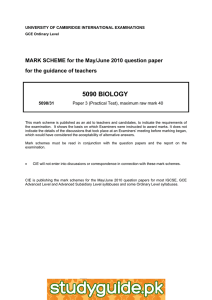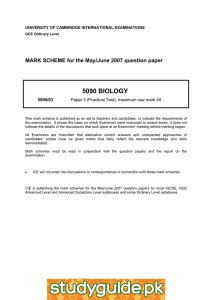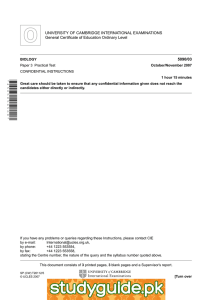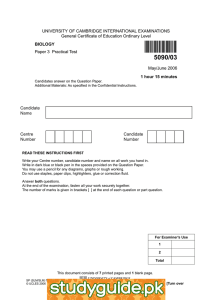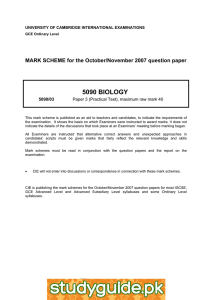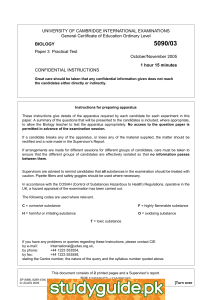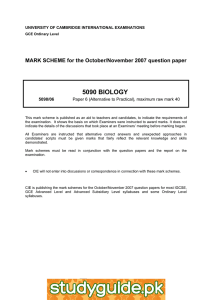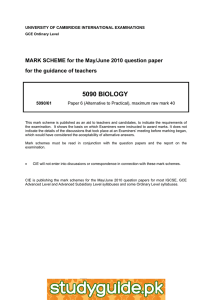UNIVERSITY OF CAMBRIDGE INTERNATIONAL EXAMINATIONS General Certificate of Education Ordinary Level 5090/01
advertisement
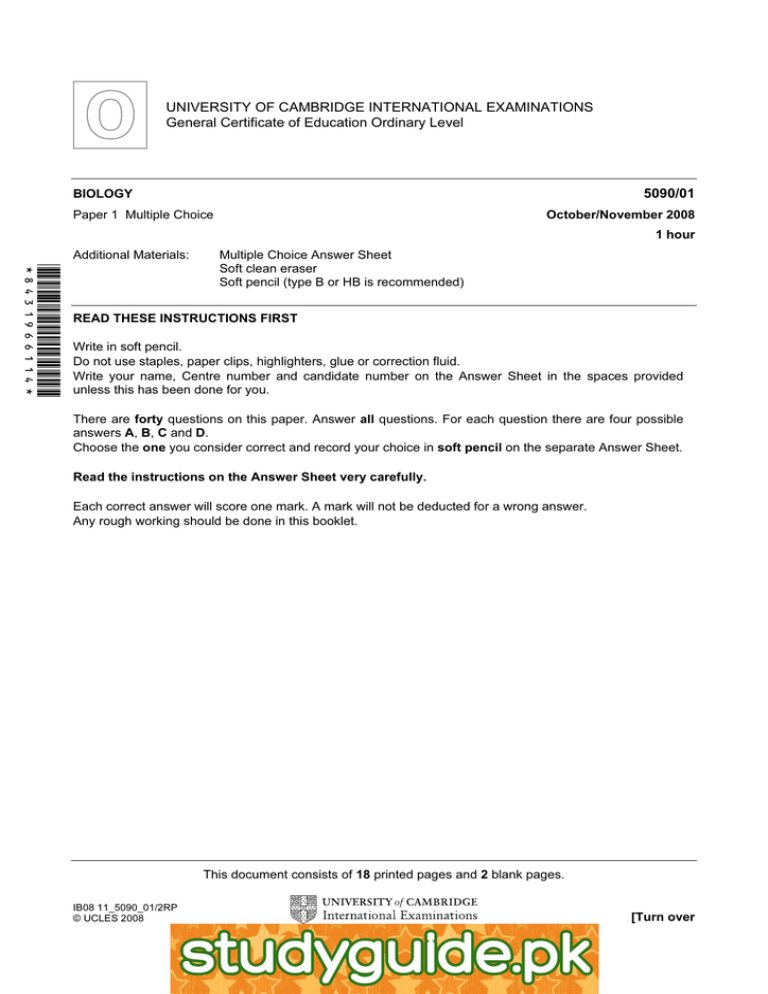
UNIVERSITY OF CAMBRIDGE INTERNATIONAL EXAMINATIONS General Certificate of Education Ordinary Level 5090/01 BIOLOGY Paper 1 Multiple Choice October/November 2008 1 hour Additional Materials: *8431966114* Multiple Choice Answer Sheet Soft clean eraser Soft pencil (type B or HB is recommended) READ THESE INSTRUCTIONS FIRST Write in soft pencil. Do not use staples, paper clips, highlighters, glue or correction fluid. Write your name, Centre number and candidate number on the Answer Sheet in the spaces provided unless this has been done for you. There are forty questions on this paper. Answer all questions. For each question there are four possible answers A, B, C and D. Choose the one you consider correct and record your choice in soft pencil on the separate Answer Sheet. Read the instructions on the Answer Sheet very carefully. Each correct answer will score one mark. A mark will not be deducted for a wrong answer. Any rough working should be done in this booklet. This document consists of 18 printed pages and 2 blank pages. IB08 11_5090_01/2RP © UCLES 2008 [Turn over www.xtremepapers.net 2 1 The diagram shows the structure of a leaf. 3 2 1 4 Which letter identifies a cell, a tissue and an organ? cell tissue organ A 3 2 4 B 1 4 3 C 4 1 2 D 2 3 1 © UCLES 2008 5090/01/O/N/08 www.xtremepapers.net 3 2 Diagram 1 shows an onion cell that has been placed in pure water. diagram 1 The cell is now placed in a concentrated sugar solution. It changes to appear as in diagram 2. diagram 2 Which statement explains the change? 3 A Sugar has moved into the cell. B Sugar has moved out of the cell. C Water has moved into the cell. D Water has moved out of the cell. Four tubes containing 10 cm3 of 1 % starch solution were treated in different ways and then mixed with saliva. After 30 minutes, 1 cm3 of iodine in potassium iodide solution was added to each tube. In which tubes were the contents a yellow-brown colour? tube incubated at 35 °C A B tube incubated at 75 °C tube incubated at pH 6.9 key C D © UCLES 2008 tube incubated at pH 2.5 = yellow-brown colour 5090/01/O/N/08 www.xtremepapers.net [Turn over 4 4 5 According to the lock and key hypothesis, which is the lock and which is the key for the enzyme lipase? key lock A fatty acids lipids B lipase lipids C lipase fatty acids D lipids lipase Which graph shows the effect of temperature on the rate of photosynthesis? A B rate of photosynthesis rate of photosynthesis 0 0 70 temperature / °C temperature / °C C D rate of photosynthesis rate of photosynthesis 0 70 0 temperature / °C © UCLES 2008 70 70 temperature / °C 5090/01/O/N/08 www.xtremepapers.net 5 6 The waterweed shown in the apparatus is illuminated and is photosynthesising. The rate is measured by bubbles of gas released. water light After a few minutes the bubbles cease. Which factor in the water might be limiting the rate of photosynthesis? 7 A carbon dioxide B magnesium C nitrate D oxygen A plant has leaves that are partly green and partly white. The plant is destarched and a leaf is partly covered by black paper. The plant is placed in bright light for several hours. Four discs are then cut from the leaf in the positions shown and are tested for starch. black paper 1 3 2 green area white area 4 Which discs contain starch? A 1 only © UCLES 2008 B 1 and 2 C 2 only D 3 and 4 5090/01/O/N/08 www.xtremepapers.net [Turn over 6 8 The diagram represents a section through the small intestine. X What is the role of the structures labelled X? 9 A They help to move the food along. B They make a large surface area for absorption. C They protect against bacteria. D They move mucus over the surface. The diagram represents a villus. 1 2 3 3 4 4 Which sequence correctly describes the functions of the numbered parts? 1 2 3 4 A absorbs digested fats absorbs glucose produces enzymes produces mucus B absorbs digested fats absorbs glucose produces mucus produces enzymes C absorbs glucose absorbs digested fats produces enzymes produces mucus D absorbs glucose absorbs digested fats produces mucus produces enzymes © UCLES 2008 5090/01/O/N/08 www.xtremepapers.net 7 10 It has been shown that animals restricted to a diet of milk only, eventually suffer from blood disorders involving a lack of pigment in their red blood cells. Which is the most likely explanation of this? A Milk is deficient in iron. B Milk contains more calcium than is required by most animals. C Milk is deficient in vitamin A. D Milk contains no roughage. 11 Crop plants are grown in well-watered soils. Their root hair cells have higher concentrations of mineral ions than in the soil surrounding them. What processes are used by these plants to absorb water and mineral ions? water mineral ions A active uptake osmosis B diffusion osmosis C osmosis diffusion D osmosis active uptake © UCLES 2008 5090/01/O/N/08 www.xtremepapers.net [Turn over 8 12 The diagram shows two plant cells, X and Y, drawn to different scales. X Y Samples of the contents of X and Y were tested. What results are expected? X Y Benedict’s reagent iodine Benedict’s reagent iodine A + + + + key B + – + – – = negative result C – + – + + = positive result D – – – – 13 The graph shows the pressure changes in the left atrium and the left ventricle while the heart is beating. At which point do the atrio-ventricular (bicuspid and tricuspid) valves close? 16 key left atrium left ventricle pressure 8 / kPa 0 time / s 0 A B © UCLES 2008 C 1.0 D 5090/01/O/N/08 www.xtremepapers.net 9 14 The table shows substances that pass between capillaries and tissues in a part of the body. into the capillaries from the tissues substance out of the capillaries into the tissues oxygen key carbon dioxide = does pass amino acids urea In which part of the body are these capillaries? A between the alveoli B in the kidney C in the liver D in the villi 15 Look at the diagram of a heart. Which vessel is a vein carrying oxygenated blood? B C D A bicuspid valve tricuspid valve 16 Which equation represents anaerobic respiration in yeast? A glucose → alcohol + carbon dioxide B glucose → alcohol + water C glucose → lactic acid + carbon dioxide D glucose → lactic acid + water © UCLES 2008 5090/01/O/N/08 www.xtremepapers.net [Turn over 10 17 The table shows the composition of inspired and expired air. inspired air % expired air % 20 16 carbon dioxide 0.04 X nitrogen and inert gases 79.96 Y oxygen What are the likely percentages at X and Y? X Y A 0.04 83.96 B 4 80 C 20 64 D 83.96 0.04 18 The diagram shows an investigation into the respiration of germinating seeds. soda lime (sodium hydroxide) test tube capillary tube germinating seeds indicator fluid The indicator fluid in the capillary tube shown in the diagram above will A move away from the test-tube because of oxygen output by the seeds. B move towards the test-tube because of carbon dioxide intake by the seeds. C move towards the test-tube because of oxygen intake by the seeds. D remain stationary, because carbon dioxide output and oxygen intake are equal. © UCLES 2008 5090/01/O/N/08 www.xtremepapers.net 11 19 The diagram shows a bone from the forelimb. One end of the bone has been replaced with a metal cap. metal cap Which bone is this, and which joint does the metal cap repair? bone joint A humerus elbow B humerus shoulder C ulna elbow D ulna shoulder 20 Urea is produced in one organ, filtered from the blood by a second organ and stored inside a third organ before being expelled from the body. Which organs carry out these functions? production filtration storage A kidney bladder liver B kidney liver bladder C liver bladder kidney D liver kidney bladder 21 What is meant by negative feedback? A A change away from a set point causes a change back towards the set point. B A change away from a set point causes further change away from the set point. C A change towards a set point causes a change away from a set point. D Changes away from a set point are prevented. 22 What is a sign of diabetes mellitus? A glucose in the blood B glucose in the urine C insulin in the blood D insulin in the urine © UCLES 2008 5090/01/O/N/08 www.xtremepapers.net [Turn over 12 23 Which changes occur in the body when a person is shocked? increase in decrease in A the diameter of the pupils in the eye the speed of peristalsis B the rate of conversion of glycogen to glucose the diameter of the pupils in the eye C the rate of urine formation the rate of conversion of glycogen to glucose D the speed of peristalsis the rate of urine formation 24 The diagram represents a central nervous system. X,Y, and Z show possible sites where the system can be blocked by a local anaesthetic. brain spinal cord sensory nerve Z X Y motor nerve Of four men, one had no anaesthetic block and the other three had only one anaesthetic block at X, Y or Z. One of the men can feel a pinprick on his leg but cannot move it. Where is the anaesthetic block? A block is at X B block is at Y C block is at Z D no block © UCLES 2008 5090/01/O/N/08 www.xtremepapers.net 13 25 The bar chart shows the percentage of women who gave birth to babies of low weight, amongst smokers and non-smokers. 30 % key percentage of women having babies with low birth weight smokers non-smokers 0 What is shown by the bar chart? A More women smoke during pregnancy than do not. B Smoking during pregnancy has no effect on birth weight. C Smoking in pregnancy increases the risk of low birth weight. D Women whose babies have low birth weight must have smoked in pregnancy. 26 The table shows the characteristics of four microbes. Which one could be a virus? contains DNA contains one or more cells contains one or more cell nuclei produces spores A key B = true C = false D 27 Which group of waste materials are likely to be decomposed most quickly by the action of micro-organisms? A glass and building bricks B shredded paper C mouldy food D toxic chemicals © UCLES 2008 5090/01/O/N/08 www.xtremepapers.net [Turn over 14 28 The graph shows changes in population over time for plant and animal plankton in a lake. plant plankton animal plankton population size Jan Feb Mar Apr May Jun Jul Aug Sept Oct Nov Dec time (months) Consider the following statement in relation to the data provided by the graph. ‘Population changes in animal plankton lag behind similar changes in plant plankton because the animals feed on the plants.’ Into which category does the statement fall? A It is a reasonable interpretation of the data. B It is a restatement of the data, not an interpretation. C It is contradicted or not supported by the data. D More data are required in order for this interpretation to be made. © UCLES 2008 5090/01/O/N/08 www.xtremepapers.net 15 29 The diagram shows part of a food web. eagle ladybird aphid caterpillar fox badger thrush hedgehog snail slug tree Which is a pyramid of numbers based on this food web? A B C D 30 Which group of bacteria convert ammonia into nitrates in the nitrogen cycle? A anaerobic bacteria B denitrifying bacteria C nitrifying bacteria D nitrogen fixing bacteria 31 Which method of malarial control is effective against both adult and larval forms of the mosquito? A covering standing water B draining swamps C spraying insecticides D spraying oil on standing water © UCLES 2008 5090/01/O/N/08 www.xtremepapers.net [Turn over 16 32 In recent years, important rivers in many parts of the world have become more acidic. What has caused this change? A air pollution by sulphur dioxide B deforestation C increased use of insecticides D increased use of nitrate fertilisers 33 The diagram shows the life cycle of a species of plant. During which stage does reduction division occur? mature plant A C ovule D pollen daughter plant seed B 34 The diagram represents a section through the human skin. In which part is mitosis occurring most rapidly? A B blood capillary sweat gland C D 35 What is an advantage of feeding a baby with bottled milk rather than breast milk? A Breast milk contains antibodies. B It is easier to keep the milk free of pathogens. C The baby’s intake of food can be measured. D The milk is always at the right temperature. © UCLES 2008 5090/01/O/N/08 www.xtremepapers.net 17 36 The diagram shows the changes in the thickness of the uterus lining of a woman during her menstrual cycle. At which time is the woman most likely to be fertile? B thickness of the uterus lining C A D 0 14 28 42 days 37 When a breed of cattle with red coats is crossed with the same breed with white coats, the offspring all have coats with a mixture of red and white hairs, a condition called roan. If roan cows were crossed with a red-coated bull, the theoretical ratio of the offspring would be A all red. B all roan. C 1 red : 1 roan. D 3 red : 1 roan. 38 The diagram shows a simple genetic cross between a red flower and a white flower. Which represents the dominant phenotype? A x key B RR red flower rr C R D Rr R white flower r Rr r Rr Rr © UCLES 2008 5090/01/O/N/08 www.xtremepapers.net [Turn over 18 39 Six processes in genetic engineering are listed. 1 The bacterium is cloned. 2 The gene is copied. 3 The gene is switched on. 4 The gene is transferred into a bacterium. 5 The human gene is isolated. 6 The protein, insulin, is synthesised. Which four processes, in the correct order, show the production of human insulin by bacteria? A 2→3→5→6 B 3→1→4→6 C 5→3→2→6 D 5→4→1→6 40 Which blood group genotype is homozygous dominant? A IA I O B IA I B C IB I B D IO I O © UCLES 2008 5090/01/O/N/08 www.xtremepapers.net 19 BLANK PAGE 5090/01/O/N/08 www.xtremepapers.net 20 BLANK PAGE Permission to reproduce items where third-party owned material protected by copyright is included has been sought and cleared where possible. Every reasonable effort has been made by the publisher (UCLES) to trace copyright holders, but if any items requiring clearance have unwittingly been included, the publisher will be pleased to make amends at the earliest possible opportunity. University of Cambridge International Examinations is part of the Cambridge Assessment Group. Cambridge Assessment is the brand name of University of Cambridge Local Examinations Syndicate (UCLES), which is itself a department of the University of Cambridge. 5090/01/O/N/08 www.xtremepapers.net
